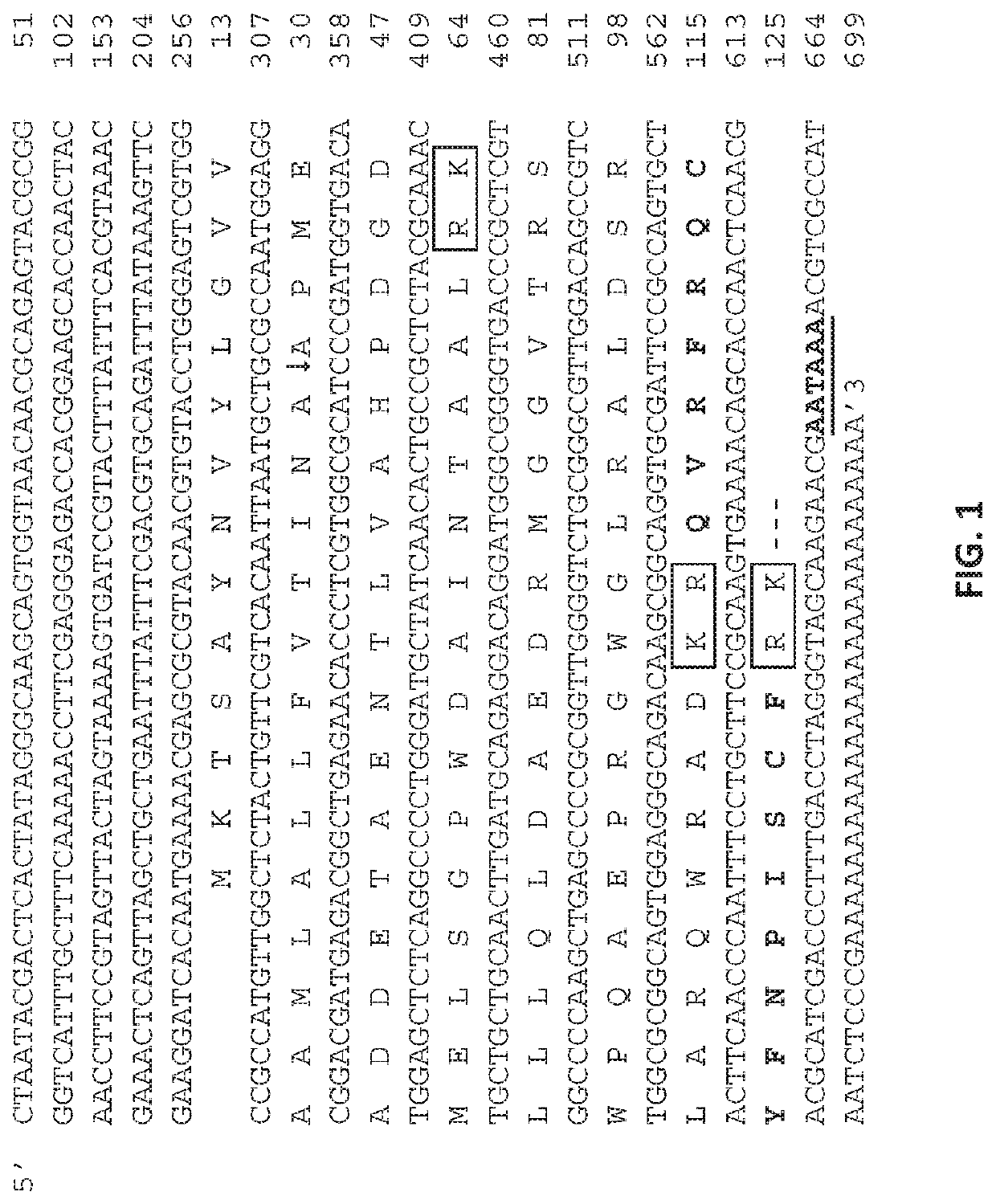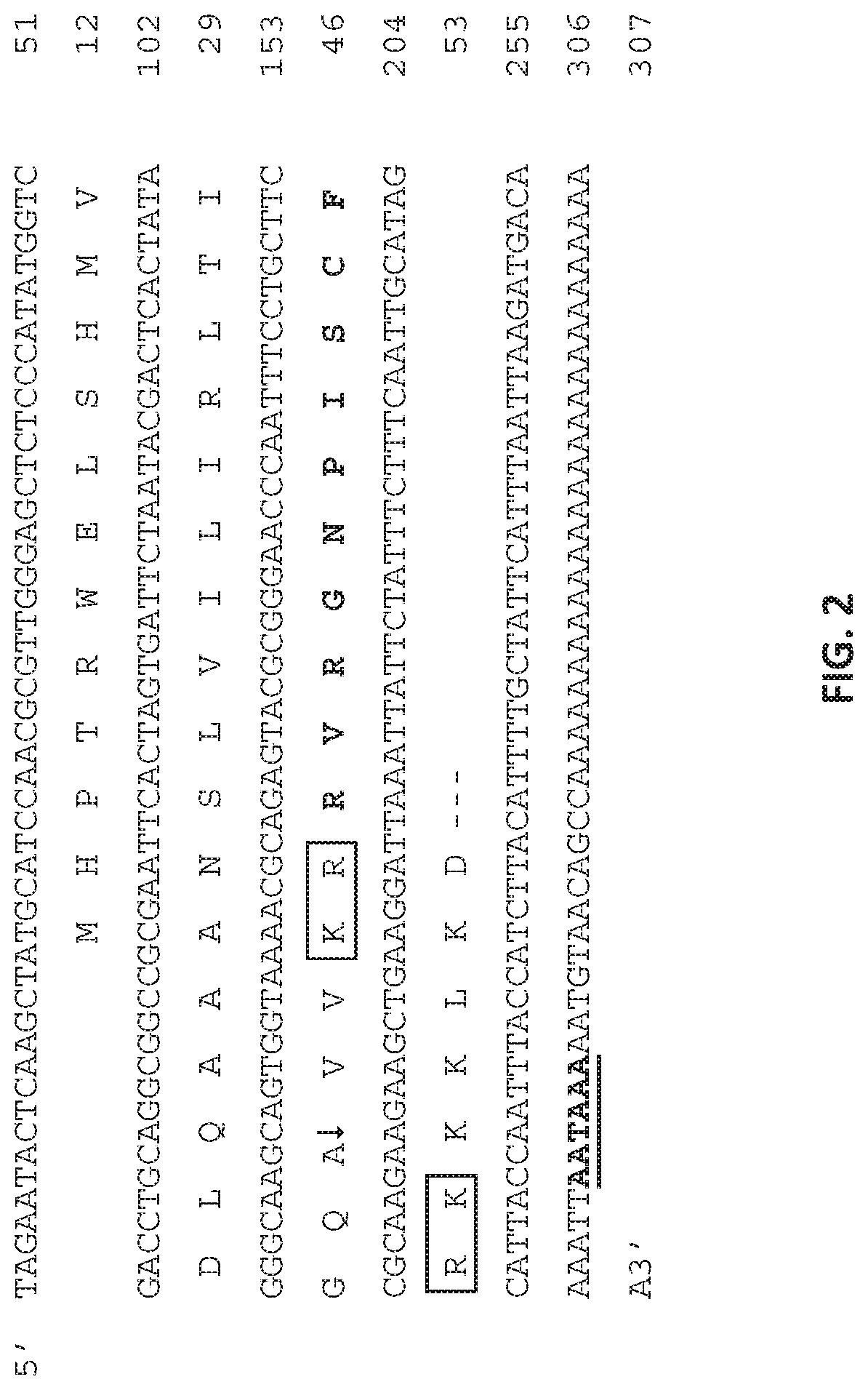Improved insect control strategies utilizing pheromones and rnai
- Summary
- Abstract
- Description
- Claims
- Application Information
AI Technical Summary
Benefits of technology
Problems solved by technology
Method used
Image
Examples
example 1
stus heros Damage Control in Soybean Achieved by “Attract and (RNAi−) Kill” of Females
[0333]Objective:
[0334]Demonstrate improvements in the damage control achieved through the attraction of females, via the TMTD pheromone, to traps baited with dsRNA food sources. Females that ingest the baited food consume dsRNA that target chromatin-remodeling ATPase transcripts, brahma, mi-2, and iswi (Fishilevich et al. (2016) Use of chromatin remodeling ATPases as RNAi targets for parental control of western corn rootworm (Diabrotica virgifera virgifera) and Neotropical brown stink bug (Euschistus heros). Insect biochemistry and molecular biology, 71: 58-71). These dsRNAs strongly reduce fecundity in the exposed female, and possibly even the next generation.
[0335]Materials and Methods:
[0336]There are three square field plots of equal size, each 12 ha, separated by at least 200 m, for attract and RNAi-kill (RNAi), traditional attract and insecticide-kill (A&K), and an Untreated Control (UTC).
[033...
example 2
Control of N. viridula with RNAi and Spodoptera Cosmioides with Mating Disruption in Soybeans
[0342]Objective:
[0343]Demonstrate improvements in the damage control of soybeans, by controlling two key pests via different modes of action. N. viridula is controlled with attract and kill-type control, using the male pheromone blend ((Z)-α-bisabolene, trans- and cis-1,2-epoxides of (Z)-α-bisabolene, (E)-nerolidol, and n-nonadecane) at traps containing dsRNA-baited food sources. S. cosmiodes is controlled with mating disruption using a sprayable formulation of Spodoptera latifascia's sex pheromone (Z9-14Ac & Z9E12-14Ac). Spodoptera latisfascia's pheromones have been shown to be effective at attracting and monitoring populations of S. cosmiodes in Brazil (Silvie, Pierre, and Jean-François Silvain IRD. Spodoptera frupperda and other species captured in pheromone traps in cotton cropping systems (Mato Grosso State, Brazil). Proceedings of the 5th Brazilian Congress of Cotton). Females, males, ...
example 3
verpa armigera Damage Control in Corn Achieved by Augmenting Mating Disruption with Larvicide RNAi
[0351]Objective:
[0352]Demonstrate improvements in damage control when combining RNAi with mating disruption strategies.
[0353]Materials and Methods:
[0354]There are 3 square field plots of equal size, each 12 ha, separated by at least 200 m, for mating disruption (MD), MD with RNAi treatments, and an Untreated Control (UTC).
[0355]Inputs:
[0356]Each plot has a corn hybrid, either conventional or round-up ready, but not Bt, 115-118 RM. Fertilization, none experiment target pest control, and weed control is done as per protocol for a high yield corn farmer. Pheromone is formulated as a sprayable emulsion concentrate (Z11-16Ald 97%; Z9-16Ald 3%). siRNA (single interfering RNA) is sprayed on corn ears via drop sprayers. Potential hormone biosynthesis genes to target with siRNA are the prothoraciotropic hormone (AY286543.1 / AY780527.1), Molt-regulating transcription factors3 (AF337637.3 / FJ009448....
PUM
| Property | Measurement | Unit |
|---|---|---|
| Order | aaaaa | aaaaa |
Abstract
Description
Claims
Application Information
 Login to View More
Login to View More - R&D
- Intellectual Property
- Life Sciences
- Materials
- Tech Scout
- Unparalleled Data Quality
- Higher Quality Content
- 60% Fewer Hallucinations
Browse by: Latest US Patents, China's latest patents, Technical Efficacy Thesaurus, Application Domain, Technology Topic, Popular Technical Reports.
© 2025 PatSnap. All rights reserved.Legal|Privacy policy|Modern Slavery Act Transparency Statement|Sitemap|About US| Contact US: help@patsnap.com


